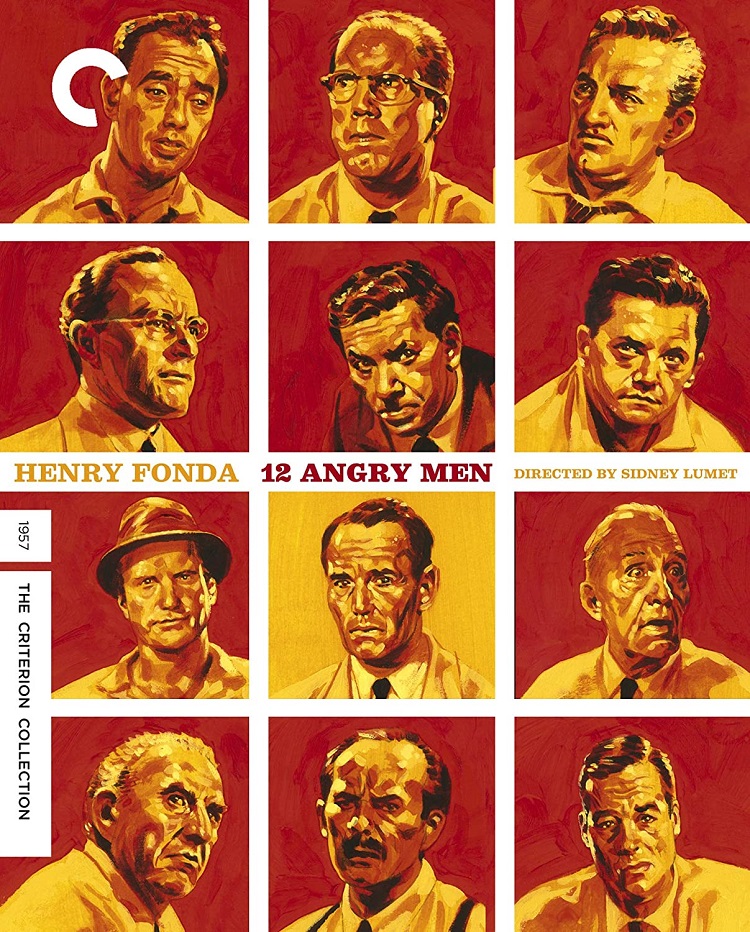
Set almost entirely in a single room, 12 Angry Men appears to be a small film yet the story reveals great thematic depth. It not only explores the U.S. judicial system, but also looks at larger philosophical issues such as perception and knowledge.
After having sat through a six-day trial, twelve men, who are only identified by their juror number, must determine if an 18-year-old boy is guilty of murdering his father as claimed by the police and witnesses. Almost immediately upon entering the jury room, a vote is taken. Eleven say guilty and one, Juror 8 (Henry Fonda, who also served as a producer), says not guilty because he thinks a discussion should be had before the boy’s fate is decided. This annoys many of the jurors, who want to get back to their lives.
As they rehash the evidence presented, Juror 8 finds ways to dispute the facts of the case and offer alternative explanations. What is also revealed is a few of the men have had their decision influenced by their prejudices toward minorities (Juror 10 played by Ed Begley) and the younger generation (Juror 3 played by Lee J. Cobb). As the deliberations continue, some jurors reconsider their vote after what they hear. Those certain the kid is guilty argue their case more strenuously and even try to bully those who were originally on their side. This causes some jurors to stand up for those who don’t stand up for themselves. It seems there’s no way they will reach a unanimous verdict.
12 Angry Men offers a captivating story by Reginald Rose, who created it first as a teleplay for CBS’ Studio One. The script demonstrates the power words can have, especially when spoken by great actors, as this cast shows themselves to be. Sidney Lumet, making his feature film directorial debut, realizes this and wisely gets out of the way for the most part, allowing the actors to tell the story.
The film offers a compelling look at the U.S. legal system, revealing it to be flawed since human beings are naturally flawed, but it also offers hope that justice will prevail more times then not if people take their civic responsibility seriously. Even more intriguing are questions not directly dealt with but raised by the film. Since senses and memories can be wrong, how do people with different perceptions and experiences agree upon a truth, which is the basis for law?
The film has been given a 1080p/MPEG-4 AVC encoded transfer displayed at an aspect ratio of 1.66:1. According to the liner notes, “this new high-definition digital transfer was created on a Spirit 2K from a 35mm fine-grain master positive. Thousands of instances of dirt, debris, scratches, splices, warps, jitter, and flicker were manually removed using MTI’s DRS and Pixel Farm’s PFClean, while Image Systems’ DVNR was used for small dirt, grain, and noise correction.” Boris Kaufman’s black and white cinematography looks great. There are very deep blacks, leading to good contrast and shadow delineation. The image looks clean and retains a healthy amount of film grain. Details, such as beads of sweat, can be seen on the men’s faces.
Also from the liner notes, “the monaural soundtrack was remastered at 24-bit from a restored 35mm magnetic print. Clicks, thumps, hiss, and hum were manually removed using Pro Tools HD. Crackle was attenuated using AudioCube’s integrated workstation.” The track is predominantly dialogue, which sounds clear and distinct. The dynamic range is limited.
Criterion offers a good many extras related to the film and its creators. The 1954 award-winning version of 12 Angry Men (1080i. 51min) was directed by Franklin J. Schaffner and features ten other men. The picture is marred by defects, but it is well worth seeing. It is accompanied by an “Introduction by Ron Simon” (HD, 14 min), who is a curator at the Paley Center for Media. “12 Angry Men: From TV to the Big Screen” (HD, 26 min) finds film scholar Vance Kepley giving a great examination of the material and the film’s creation. Kepley is so authoritative this feature makes up for the lack of a commentary track.
“Sidney Lumet” offers two pieces. “Sidney Lumet” (1080i, 23 min) is a collection of different interview sessions where he talks about his early days in TV and the influence it had on him and his future work. “Reflections on Sidney” (HD, 9 min) finds friend and writer Walter Bernstein talking about Lumet. “On Reginald Rose”(HD, 15 min) – Ron Simon discusses the writer. Criterion also presents Tragedy in a Temporary Town (1080i, 55 min) which aired on February 19, 1956 on NBC’s The Alcoa Hour on NBC. Written by Rose, directed by Lumet, and featuring some familiar faces, the play is a tense drama about a mob looking for an unknown man who assaulted a 15-year-old girl. Cinematographer John Bailey puts the spotlight “On Boris Kaufman”(HD, 38 min), who also shot On the Waterfront. Also included are the trailer (HD, 3 min, 1080p) and a 20-page booklet featuring Thane Rosenbaum’s essay “Lumet’s Faces”.
Get yourself the Criterion version of 12 Angry Men and it will make you one happy person. The film alone accomplishes that. All the extras and the high-definition presentation are icing on the cake.